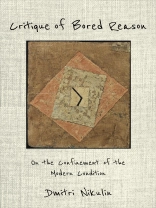Most of the core concepts of the Western philosophical tradition originate in antiquity. Yet boredom is strikingly absent from classical thought. In this philosophical study, Dmitri Nikulin explores the concept’s genealogy to argue that boredom is the mark of modernity.
Nikulin contends that boredom is a specifically modern phenomenon. He provides a critical reconstruction of the concept of the modern subject as universal, rational, autonomous, and self-sufficient. Understanding itself in this way, this subject is at once the protagonist, playwright, director, and spectator of the staged drama of human existence. It is therefore inevitably monological, lonely, and alone, and can neither escape its own presence nor get rid of it. In other words, it is bored—and this boredom is the fundamental expression and symptom of the modern condition.
Considering such thinkers as Descartes, Pascal, Kant, Kierkegaard, Kracauer, Heidegger, and Benjamin, Critique of Bored Reason places boredom on center stage in the philosophical critique of modernity. Nikulin also considers the alternative to the notion of the autonomous subject in the—nonbored and nonboring—dialogic and comic subject capable of shared existence with others.
Tabla de materias
Foreword
Abbreviations
Acknowledgments
1. A Conceptual History of Boredom
2. Boredom and the Flâneur
3. Critique of Bored Reason
4. Being and Boredom
5. The Nonboring Well-Being
6. Scandal
In Place of a Conclusion: On Method
Notes
Bibliography
Index
Sobre el autor
Dmitri Nikulin is professor of philosophy at the New School for Social Research. He is the author of a number of books including
Dialectic and Dialogue (2010),
Comedy, Seriously (2014),
The Concept of History (2017), and
Neoplatonism in Late Antiquity (2019).












